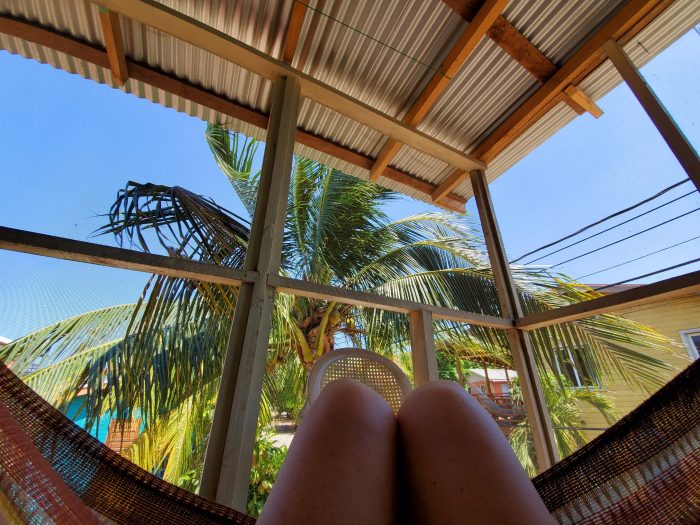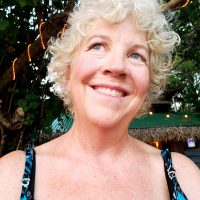“And if I pass this way again, you can rest assured, I’ll always do my best for her, on that I give my word.” ~ Bob Dylan
~
This quote, from Dylan’s “Shelter from the Storm” is a vow I made to myself when I decided to share this story.
It helped me realize that maitri is a necessary practice, especially when my old patterns of thinking are anything but friendly to myself.
As an older woman, solo travel has different challenges that are helped by little things like going to yoga studios in the jungle, staying in private rooms at hostels, and meeting other travelers in common areas.
But an unexpected experience in Belize smashed me right into myself.
It was March 20th when the coronavirus stay-at-home orders went into effect in Nevada. I had been separated from my long marriage in Seattle, and in November 2019, I rented out my place in Reno, Nevada, and decided to travel to Costa Rica for the winter and early spring.
Then coronavirus came.
I had planned to rent a small beach house for $400 a month in a non-touristy town in Costa Rica early in April. Because of the lockdown, I had to move quickly to get there and ride out the virus—though I didn’t know for how long. I had plans to go directly to Costa Rica, but ended up leaving a few weeks earlier, right after lockdown. I decided to go to Belize for a few days, which had no reported cases, before heading to the house in Costa Rica. Although everything was still open in Central America, I had a sense of urgency.
I booked my flight and took a COVID test to make sure I was negative before I left.
I arrived in Belize City on March 24: the day the first case of coronavirus was reported in Belize. The airport and borders were closing just as I deplaned. What am I going to do? No one is social distancing. My thoughts rambled as I clutched my passport and negative coronavirus test in the frantic, outdoor immigration line.
A week later I entered, soaked from the heat and humidity, to the shock of a cold, air-conditioned, tiny print shop. My platinum hair was tied back with a red bandanna to keep it from my face, which was sticky from sunscreen and sweat. I needed my bank statement for immigration to extend my visa. And I was stranded and alone in Placencia, Belize.
“People like you aren’t going to come here and f*ck up my life and ruin my business. You’re not going to give the coronavirus to me and my son. Why aren’t you in quarantine?”
The woman’s voice was amplified in that tiny print shop, triggering me and bringing up the memory of every person who had ever yelled at me. Feeling my childhood need to explain myself, I told her I had arrived legally a week earlier. I had picked up my negative test the night before I traveled. She interrupted,
“Don’t try to explain yourself out of this!”
She was an American expat.
What I thought was small chitchat, was a subtle interrogation. I shook while looking up my bank statement on my phone, her voice escalating as my first three attempts failed from nerves. Rattled, I walked out with my statement, down the hot dusty road to the Hokey Pokey Water Taxi dock. A small, flat-bottom boat would take me to Independence, Belize, where the immigration office was located.
I waited on a wooden bench, in partial shade, while talking with friendly, local water taxi employees and waiting for the boat. I was anxious, but they made me laugh and forget about the argument. I needed to get on the water, away from Placencia.
I heard vehicle wheels slowly rolling through the gravel in the parking lot and several doors slam. As I spoke, I heard footsteps crunching the gravel, coming closer to me.
“I need to see your passport,” a man said in his deep, Caribbean accent.
I was still smiling as I looked up at his unsmiling face, but I could see from his expression that there was nothing funny going on here. He was wearing a cheerful, royal blue shirt with a Belize Tourism logo. Two other men and one woman, wearing the same shirts, were behind him, holding batons. Again, tension rose as I rushed to find my passport. The chatter in my mind blindsided me, leaving self-loathing, confusion, and shame fighting for space within me.
I handed my passport to the tourism official and he walked toward the truck. I now understood that the Belize Tourism sign, with its upbeat colors and lettering was not a welcome sign that day. Looking for some reassurance from the locals I had been talking with, I noticed they had looked away, except one young man, who was sitting on a curb watching in side glances just a few feet from us.
I was told to get in the backseat; the female tourism official sat next to me. The man who had my passport drove us a block, on a gravel side road, to the police station.
The station was similar to a large, dark garage, and I had trouble seeing after being led in from the bright warm sunlight. I heard the legs of a chair scraping the concrete floor, then pushed against a wall. I turned toward the sounds and a woman in a brown police uniform told me to sit down. I quickly texted my son that I was at the police station. The woman saw me and said if I touched my phone again, she would take it from me.
What must my son be thinking of that one line text?
An officer handed me my passport and led me outside. I thought I was free to go, but another woman in uniform was waiting for me—the Police Chief of Placencia. Four men with machine guns surrounded me to keep my distance, but were close enough to hear her tell me that I’d been reported as “not in quarantine.” She said the laws had changed in the last few days.
I began to cry hard, gasping to talk, to breathe, rage pulsing through me. Exasperated, I told her I came legally and that quarantine wasn’t required from the city I flew from. I said I took a coronavirus test, which wasn’t required, to make sure I was negative before I arrived for a few days. I knew from her expression that arguing was dangerous, so I stopped talking.
She asked how long I had been in Belize and glared when I said, “One week.” She pointed to the four men to walk me to my cabana for a two-week quarantine. I saw the print shop woman on her bike. Through my tears, I looked at her face; she steered her bike as close as she could and smiled.
I was threatened with fines and jail if I left my porch. My food was delivered from a grocery store and left outside of my screen door, with my payment under a rock on the top step. The police visited every day and asked neighbors if they saw me leave.
I looked around the porch of the green, wooden Belizean house and saw where I would be. In the corner, there was a large, multicolored hammock and one palm tree on the other side of the screen. I was the only white person in the neighborhood, hopeful that any neighbors would look up and say hi to me. They were afraid because I was from the U.S. and thought I brought coronavirus to Belize. Some said later they were also afraid of me because they assumed I liked President Trump, which at least made me laugh. I was able to put them at ease about that. Mostly, it was the woman who rented the cabana and her young maintenance man who waved and occasionally talked to me.
I woke up the first morning with my face wet with tears. I practiced yoga before my day on the porch. In my hammock, with headphones on, l listened to the news on YouTube, seeking updates and information about the coronavirus. I needed to distract myself from the haunting, relentless calls from mating mourning doves. But then, they reminded me of a verse from a song I loved: “I’ve heard newborn babies wailin’ like a mourning’ dove,” from Dylan’s “Shelter from the Storm.”
It took me back to a great time when I was younger, when I listened to that same song on Dylan’s Blood on the Tracks album when it was first released. It was my favorite album. I often went camping with a guy who was a friend of one of my older brothers. He was a positive influence and let me tag along. I thought of our fun trips on the rivers in Oklahoma, in hammocks like these that he and a friend brought back from Mexico. I played the song on YouTube all afternoon, hiding in the hammock, remembering how those times felt. My friend had been my shelter from my controlling family. And those lyrics resonated with me again in my need to feel safe.
One day, an iguana slowly crawled up the trunk of the palm tree, out on a frond, and the breeze swayed it to sleep. All afternoon, crows and doves attacked and screeched at the iguana to get away from their nearby nests, but it never cared. It only drifted in and out of its daze.
Could I be like that iguana? No fear? Harassment all around but at peace within? The iguana was more powerful in its world than I was, I thought.
It started to sink in. This was survival; it was impossible to hold back my feelings. I could lose my mind in this hammock, but no one would be there to save me. I had to feel everything pass through.
“Shelter from the Storm” found me again through something so unnerving as the constant call of the mourning doves, with only my headphones to escape them.
“I came in from the wilderness, a creature void of form
Come in, she said
I’ll give ya shelter from the storm.”
I’ve learned now that the “she” in the song, this time, is me.
Maitri, I now know, is having compassion and forgiveness for myself. Toward the end of my time in the corner on the porch, I was able to have more compassion and understanding for the angry woman and her fear than for myself. I understand I have more work to do within to offer myself that same love and compassion.
I spent two and a half more months stranded in Belize after I was released from quarantine. I opened the screen door and walked down the wooden stairs toward uncertainty.
~
~


 Share on bsky
Share on bsky





Read 18 comments and reply